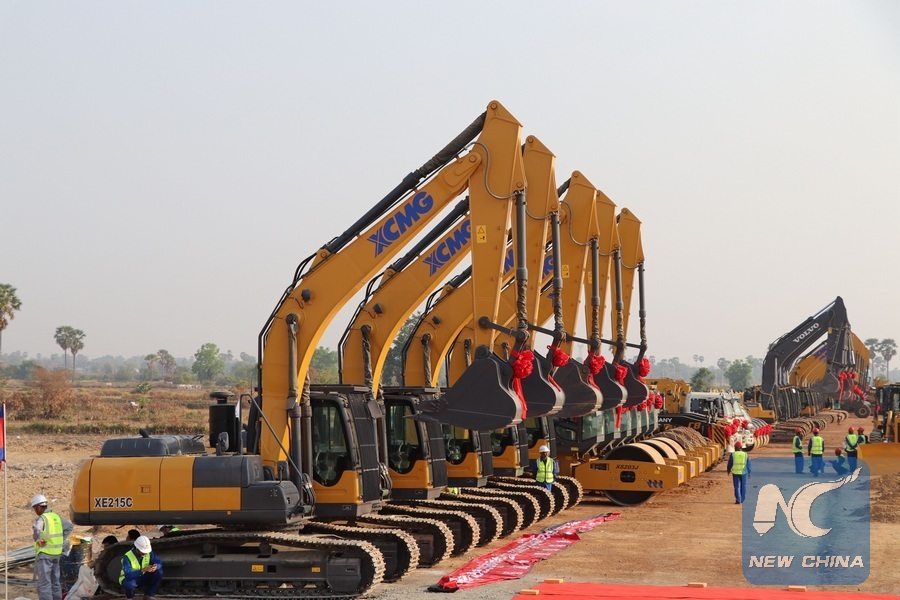
File photo shows Machines line up during a groundbreaking ceremony for the construction of a 190-km expressway stretching from capital Phnom Penh to the deep-sea port province of Preah Sihanouk in Kampong Speu, Cambodia, March 22, 2019. (Xinhua)
ADDIS ABABA, June 19 (Xinhua) -- The newly inaugurated Chinese-built 220-km toll road that connects landlocked Ethiopia to ports in Djibouti will meet Ethiopia's growing import-export needs, an Ethiopian official told Xinhua.
Ethiopian Roads Authority (ERA) Communications Director, Samson Wondimu, said on Tuesday the asphalt concrete toll road, which was inaugurated on Sunday, connects Ethiopia's eastern city Dire Dawa to the border town of Dewele neighboring Djibouti.
"It will significantly meet Ethiopia's growing import-export needs by solving transportation hurdles that hindered the Ethiopia-Djibouti economic corridor from achieving its full potential," Wondimu said.
The official said that Djibouti presently handles about 95 percent of Ethiopia's export-import trade, and the 5.2 billion Ethiopian birr (about 179 million U.S. dollars) road project will further augment Ethiopia's economic growth by leveraging the performance of the eastern trade-route.
The Chinese firm, CGC Overseas Construction (CGC-OC) Group Ltd., which conducted the construction work of the project, was commended for the quality and timely completion of the road, which was 85 percent financed by the Export-Import Bank of China while the remaining 15 percent was covered by the Ethiopian government.
"The contractor finalized all procedures of the road's construction in accordance with the contract agreement, without any compromise to the expected quality," Wondimu said, adding "the project was also transferred to the Ethiopian government within the stated timeframe."
The newly built road upgraded the previously gravel road, which according to Ethiopia's Minister of Transport Dagmawit Moges, had been a major challenge to the general transportation along the eastern economic corridor. The previous bumpy road was highly dented due to frequent flooding and landslide.
The transport minister, however, said the brand new road will reduce the travel time from the previous 10 hours to around 4 hours.
"The Dire Dawa-Dewele asphalt concrete toll road, in addition to transforming Ethiopia's import-export endeavor by significantly reducing the cost of travel and time, will further strengthen the people-to-people relations between Ethiopia and Djibouti," Moges said.
The project was commenced in 2016 following an agreement between ERA and the Chinese construction firm. It is the second toll road in the East African country, next to the 85-km Addis Ababa-Adama toll expressway.
Ethiopia, as one of the countries cooperating with China in the implementation of the Belt and Road Initiative, had previously accomplished various other major infrastructure projects, including Africa's first transnational electrified railway, linking Ethiopia's capital Addis Ababa with the Red Sea nation Djibouti.
Costantinos Bt. Costantinos, who served as an economic advisor to the African Union (AU) and the United Nations Economic Commission for Africa (ECA), told Xinhua on Tuesday that Ethiopia, being one among the first African countries cooperating with China under the BRI, "has been witnessing the positive outcomes of its engagements with China."
"One can think of the Addis Ababa-Djibouti Railway (or Ethiopia-Djibouti Railway), the Addis Ababa Light Railway, the Addis Ababa - Adama Expressway, the various industrial parks that are being built in almost every corner of the country, the new airports, as well as many other development projects... all could be seen as successfully cognizant to the growing demands of Ethiopia's expanding economy," Costantinos said.
According to the expert, the East African country could further benefit from the BRI by increasing its cooperation with China, mainly with a particular emphasis to Ethiopia's transport sector.
According to figures from ERA, as the Ethiopian government envisages to enhance road connectivity across the country, road mileage has increased from 26,000km to 150,000km over the past two decades in the country.
The Addis Ababa-Adama expressway, as the first expressway in the East African region, is considered as Ethiopia's major road project, covering the busiest segment of Ethiopia's vital road infrastructure linking the capital to Djibouti Port.
Ethiopian Toll Road's Enterprise General Manager, Mustefa Kedir, also told Xinhua recently that the Addis Ababa-Adama expressway has solved the previous severe traffic congestion that had been extensively affecting Ethiopia's aspiration to grow the economy.
According to Kedir, the expressway, which was inaugurated back in 2014, has been a major catalyst boosting the transport flow along the main economic corridor.

